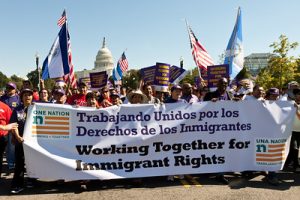In November of 2005, Bush proposed the following to fix the immigration system in America:
As we enforce our immigration laws, comprehensive immigration reform also requires us to improve those laws by creating a new temporary worker program. This program would create a legal way to match willing foreign workers with willing American employers to fill jobs that Americans will not do. Workers would be able to register for legal status for a fixed period of time, and then be required to go home. This program would help meet the demands of a growing economy, and it would allow honest workers to provide for their families while respecting the law.
Fourteen years later this statement seems to resonate with the overall sentiment that many Americans still have towards immigrant populations: Immigrants do not deserve to exist on the same level as Americans do. They do not deserve fair working conditions, stability, or a good education if it threatens the privilege that comes with being an American. If immigrants work, then it should be purely for the benefit of American citizens and for the American economy, not for the livelihood of normal people who want to feed their families and make a living.
And what type of jobs will Americans not do? Are Americans above certain professions, and are those professions reserved only for immigrants? Let’s not forget that at one point, the very jobs that white Americans did not want to do were forced upon black slaves. Before they were even considered Americans under the Constitution, slaves were pushed to exhaustion and death for the growth of the American economy (check out New York Times‘ podcast 1619, Episode 2 for more information). But slaves did not benefit from this economy. As American wealth accrued, it became more concentrated in the hands of the government and the plantation owners. In other words, white America.
Some may think that this comparison is ill-fitting to the narrative surrounding immigrant labor, specifically because immigrants chose to come to this country whereas slaves were forcefully brought to the states. Or because people get tired of someone bringing up slavery because it ended centuries ago. But the truth is that our history prides itself in diversity because that diversity is used as a means to exploit labor, more often than not, from people of color. But remember that there are many families who are forced to leave their countries because they are afraid of their livelihoods.

CC image credit: ep_jhu | Flickr
Bringing in foreign labor grows our economy, but this rhetoric often promotes the notion that immigrants need to work tooth and nail to prove themselves worthy of basic comforts in life. And if we expect immigrants to work in the industries that are unfavorable to Americans, that assumes that we intend to keep them there. Immigrants apparently don’t deserve adequate healthcare, a decent education, or a well-paying job. They deserve to stay at the bottom, and we only revere them if they somehow overcome impossible obstacles.
It doesn’t help that President Trump and his administration have been perpetuating lies, claiming that “Illegal immigration hurts Americans workers, burdens American taxpayers and undermines public safety, and places enormous strains on local schools, hospitals and communities in general, taking precious resources away from the poorest Americans who need them most”.
Most who disagree with this blatant falsehood often counter by pointing out that immigrants contribute heavily to the economy. They tell us that, for example, second generation immigrants “contribute about $1,700 per person per year. [By comparison], all other native-born Americans, including third generation immigrants, contribute $1,300 per year on average”. But again, why should immigrants feel that they should contribute even more to the economy than others? Only because they or their parents happened to be born in a foreign country? We should start respecting immigrants for the human beings they are, not merely for their contributions to the American economy. Immigrants already contribute more than their fair share, and now we as a society should give them the space and the resources to grow on their own terms – not for our own benefit, but so that they can live meaningful lives however they define them.



